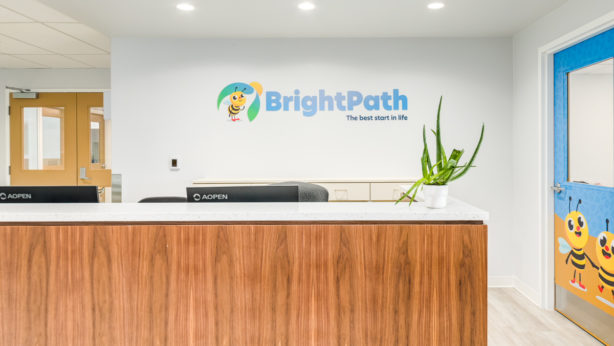Choosing the right daycare for your child is a crucial decision that can feel overwhelming. Every parent wants a safe, nurturing environment that supports their child’s growth and meets the highest standards of care. This guide provides everything you need to make an informed choice, including resources and websites to find child care centers in your area, tips for identifying the perfect daycare, key questions to ask providers, and when to begin your search. You'll also learn how to spot red and green flags to ensure your child is in the best hands. Let this guide simplify your journey to finding the ideal daycare for your family.
Where to Start Your Search For Daycare?
1. Child Care Locator in Your City
Many cities have online child care locators to help parents find licensed daycare facilities in their area. These tools often include valuable details such as contact information, reviews, and services offered.
Child Care Resource and Referral (CCR&R) Agencies
- These agencies operate in many regions and offer free resources to help parents locate licensed daycare centers. Visit ChildCareAware.org to find a CCR&R agency in your area.
State-Specific Resources
The Childcare.gov website provides a convenient tool for selecting your state, redirecting you to the specific child care locator for that region. Here are some examples of state-specific resources to help you find quality care:
- Ohio: Childcaresearch.ohio.gov offers a searchable database of licensed child care providers in Ohio, helping parents find regulated care options across the state.
- Massachusetts: Mass.gov includes a child care search tool where parents can find licensed providers in Massachusetts, with details on availability and compliance with state regulations.
- California: MyChildCarePlan.org offers a detailed locator for child care providers across California, helping parents identify centers that meet their specific needs and preferences.
- New York: The OCFS Child Care Search on the New York State Office of Children and Family Services website helps you find local child care options while providing important details about licensing and regulations.
- Connecticut: The 2-1-1 Child Care Search Engine offers a comprehensive tool for finding licensed child care providers in Connecticut, tailored to parents' needs.
Local Government Websites
Many city or county websites provide child care locators. For example:
Regional Networks
- NACCRRA Interactive Map: The National Association of Child Care Resource and Referral Agencies provides a tool to locate licensed facilities in every U.S. state, complete with inspection reports and other regulatory details.
Canadian Resources
2. Explore Online Directories
Daycare directories like Yelp, Yellow Pages, Bing Places, Next Door and others can provide lists of daycare centers near you. These platforms often include reviews from other parents, giving you insight into the experiences of families who’ve used their services.
3.Utilize Daycare-Specific Directories
Websites such as Winnie.com, Daycare.com, Care.com, Sittercity , Nanny Lane , UrbanSitter ,and MomTrusted , Child Care Avenue, specialize in helping parents find daycare options. These platforms often provide advanced filters to help you search based on location, budget, and specific needs.
4. Conduct a Google Search
Search terms like “daycare near me” or “childcare near me” can yield a variety of results. Take note of centers listed in your search and visit their websites for more information.
5. Look for NAEYC-Accredited Centers
The National Association for the Education of Young Children (NAEYC) accredits child care centers that meet rigorous standards. Use their search tool to find accredited centers near you. If there isn’t one nearby, you can ask prospective centers how they align with NAEYC’s guidelines, outlined in their “Guide for Families.”
6. Ask for Recommendations
Word of mouth is invaluable. Speak to friends, neighbors, coworkers, or family members about their experiences and recommendations for daycare providers.
7. Check Community Centers and Religious Institutions
Your local church, synagogue, mosque, or community center may have daycare programs. These options often provide a sense of community and shared values.
8. Engage with Online Parenting Communities
If you’re part of a Facebook parenting group or other online forums, ask fellow parents for their daycare recommendations. These groups often have firsthand accounts of experiences with local providers.
9. Home-Based Child Care Options
If you prefer a more personal, in-home child care experience, look for providers accredited by the National Association for Family Child Care (NAFCC). Their search tool can help you find high-quality, in-home child care options.
10. Check Licensed Home Child Care Agencies
Licensed home child care agencies often have listings of trusted providers. These agencies oversee the quality and licensing of in-home caregivers, providing an additional layer of reassurance. Check ChildCareAware.org for a CCR&R in your area, MyChildCarePlan.org if you live in California, New York State Office of Children and Family Services (OCFS) if you live in New York, Texas Health and Human Services Commission (HHSC) if you live in Texas and Websites like Kijiji can be a resource for finding home daycare providers in Canada. Search for terms like “home daycare” along with your location to discover local options.
How to Identify and Choose the Perfect Daycare?
Choosing a daycare isn’t just about convenience or proximity, it’s about ensuring your child thrives in a safe, nurturing, and stimulating environment. While feeling comfortable with a center is important, it’s equally vital to assess its quality through objective standards. Here’s how to identify a daycare that truly meets your child’s developmental needs:
1. Conduct Thorough Online Research
Start by looking up reviews and feedback from other parents. Platforms like Google Reviews, Yelp Reviews, Winnie Reviews, Quora, Reddit and parenting forums are excellent resources for honest opinions. Check for consistent patterns in reviews about cleanliness, staff behavior, and overall satisfaction.
2. Look for “Green Flags” in the Environment
A high-quality daycare should have:
- Well-Organized Spaces: Rooms stocked with age-appropriate toys and materials. Some light mess (like a few dumped-out bins) shows active engagement, but everything should have a designated place.
- Structured Yet Flexible Schedules: A balance of structured activities (art, music, reading, dramatic play) and free play is ideal. Reading should be part of the daily schedule at least twice.
- Child-Centric Design: Labeled cots, kid-sized furniture, and lots of children’s artwork on the walls signal a focus on child development.
- Parent Communication Tools: Centers with apps or communication systems that provide updates about meals, activities, and milestones can help you stay involved in your child’s day.
3. Assess Health and Safety Practices
Ask about the center’s policies on:
- Immunizations: All children should have up-to-date immunizations.
- Hygiene: Procedures for handwashing, diaper changes, and dealing with sick children should be clearly defined.
- Emergency Preparedness: Plans for fires, floods, lost children, and other emergencies should be in place and regularly practiced.
4. Ensure Proper Supervision Ratios
Staff-to-child ratios are crucial for your child’s safety and development. Here are the average practice recommendations for caregiver ratios:
- Infants: 4 children per caregiver (4:1 ratio).
- Toddlers: 6 children per caregiver (6:1 ratio).
- Preschool: 10 children per caregiver (10:1 ratio).
- School Age: 15 children per caregiver (15:1 ratio).
Ask the daycare about their specific ratios and observe whether caregivers are attentive to all children, even during nap times.
5. Check Staff Qualifications and Development
Quality daycare centers invest in their staff. Ask about:
- Educational Background: Do teachers and administrators have degrees in early childhood education?
- Professional Development: Are staff members required to attend regular training sessions to sharpen their skills and stay updated on best practices?
6. Verify Licensing and Inspection History
Every state provides a database where parents can check a daycare’s licensing status and inspection history. These resources often detail inspection results, violations, and whether the center has faced any serious issues, such as injuries or abuse.
- Background Checks: Federal law mandates five background checks for child care staff (and adults in home-based care settings). However, only some states fully comply. Parents should directly confirm with the daycare whether these checks have been completed.
Background checks include:
- National FBI criminal history and sex offender registry checks.
- In-state and interstate criminal history, sex offender, and child abuse registry checks.
Despite challenges with the interstate background check process, it’s essential to ask about the status of these checks for anyone interacting with your child.
7. Observe Staff Interaction
Pay attention to how staff engage with children during your visit:
- Are they attentive, nurturing, and encouraging?
- Do they take time to share daily updates with parents?
- Are they able to provide personalized feedback on your child’s progress and needs?
By taking these steps, you can confidently choose a daycare that not only fits your logistical needs but also provides a safe, stimulating, and caring environment for your child’s growth. Remember, a good daycare prioritizes your child’s well-being, development, and happiness every step of the way.
Questions to Ask When Visiting a Daycare Center
When visiting a daycare center for the first time, it’s essential to ask detailed questions to ensure they align with your expectations and your child’s needs. Below is a comprehensive list of important questions, along with some additional points you might not have considered. Feel free to add your own based on what matters most to your family.
1. Class Size and Teacher Ratios
- How many children are in each class?
- What is the ratio of children to teachers for each age group?
2. Parent and Family Access
- Can parents or family members stop by unannounced at any time?
- Are there virtual check-in options, such as live streaming or photo updates?
3. Teacher Qualifications and Training
- How many teachers work at the center?
- What percentage of teachers are certified in early childhood education?
- Do teachers receive ongoing professional development or training?
4. Hours and Late Pick-Up Policy
- What are the hours of operation?
- What happens if I’m late for pick-up? Are there fees?
5. Infant Care Policies
- How are breast milk and formula stored?
- Are infants fed on demand or on a set schedule?
- Are all infants put to sleep on their backs on firm, safe sleep surfaces without loose bedding or toys?
6. Nutrition and Meals
- If food is provided, does it meet nutritional standards?
- Is the food cooked in-house or sourced from a catering provider?
- Can the center accommodate dietary restrictions or allergies?
7. Daily Routines and Activities
- What is the daily schedule for each age group?
- What types of weekly activities are offered (e.g., art, music, outdoor play)?
- Is there any screen time, and if so, how much and what content is shown?
8. Licensing, Inspections, and Safety
- Is the program licensed?
- When was it last inspected, and how often are inspections conducted?
- Are background checks conducted for all staff?
- How is the outdoor play area secured and maintained?
9. Communication with Parents
- Will I receive daily updates or reports about my child’s activities and progress?
- Is there an app or platform for real-time updates?
10. Hygiene and Facilities
- How often are diaper-changing areas cleaned and sanitized?
- Are the washrooms close to the classrooms?
- Are hygiene practices (e.g., handwashing) taught and reinforced with the children?
11. Naptime Arrangements
- What are the nap routines for different age groups?
- What kind of bedding is provided, and how often is it cleaned?
12. Toilet Training
- Will the staff assist with potty training?
- How is the process managed, and how are parents kept informed?
13. Illness Policies
- What happens if a child becomes sick during the day?
- When can a sick child return to daycare?
- Are there policies for managing contagious illnesses?
14. Fees and Payment Options
- What is the cost of the program? Are there any additional fees?
- What is the payment schedule? Are there late payment penalties?
- Does the center offer subsidies or financial aid options?
15. Scheduling and Closures
- What is the vacation schedule?
- Are there any planned closures for holidays or staff training?
16. Drop-Off and Pick-Up Logistics
- Are there designated parking spaces or drop-off/pick-up zones?
- What is the procedure for ensuring a safe handoff during drop-off and pick-up?
When Should You Start Looking for Child Care Options?
The search for child care is a task that often requires more time than parents anticipate. Many daycares have waitlists that can extend up to a year, or even longer in highly sought-after areas. This means it’s never too early to start exploring your options, even if your baby hasn’t arrived yet.
Ideal Timeline for Starting Your Search
-
During Pregnancy:
Begin researching child care options as early as your second trimester. This allows you to visit centers, interview providers, and compare offerings without feeling rushed.
-
3–6 Months Before You Need Care:
For parents who didn't start the search earlier, aim to secure a spot at least three to six months before your desired start date. This timeline applies to both daycare centers and in-home child care.
Why the Early Start Matters
- High Demand for Quality Care:
The best daycare centers and in-home providers often have long waitlists, particularly for infant care. Starting early increases your chances of securing a spot at a high-quality facility.
- Time for Thorough Research:
Starting early gives you ample time to:
- Visit multiple facilities and compare their environments, programs, and policies.
- Verify licensing and inspection records.
- Interview staff and observe caregiver-child interactions.
- Flexibility to Negotiate or Adjust Plans:
If your top choices are full, you’ll have time to join waitlists or explore alternative arrangements, such as nanny-sharing or hiring a private caregiver.
Pro Tips for Getting Ahead of the Waitlist
- Join Multiple Waitlists: Don’t limit yourself to one daycare. Signing up for several waitlists increases your odds of finding a spot when you need it.
- Ask About Sibling Priority: If you’re planning for more children, check if the daycare gives priority enrollment to siblings of current attendees.
- Consider Flexible Start Dates: Some centers may be more willing to accommodate families who can be flexible with start dates.
- Network with Other Parents: Ask friends, neighbors, or local parenting groups about child care options they’ve had success with.
What If You’re Starting Late?
If you find yourself in need of child care with little time to plan:
- Use Online Platforms: Websites like Care.com, Winnie, and Sittercity often have listings for providers with immediate availability.
- Explore Backup Options: Some workplaces offer emergency or temporary child care solutions, so check with your employer.
The earlier you begin the process, the more options you’ll have to ensure your child gets the best possible care. Planning ahead can also save you the stress of scrambling for last-minute arrangements.






